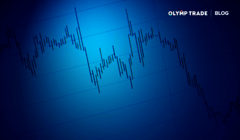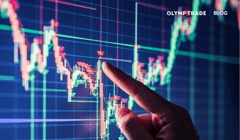
Well-known financial instruments such as futures and stocks never lose their relevance in the market, but which of the two is better? In order to answer this question, we need to first understand the fundamental difference between them. In this article, we will explain the difference between futures vs. stocks trading and what they are.
Contents:
Interact with the underlined words and green dots to get additional details and explanations.
Additional context for the visuals.
Explanations and definitions of terms.
Basic definitions
A stock is one of the simplest types of security. It is essentially an asset certifying the owner’s share in a company. Let’s say Company A has issued 100 shares. If we buy 10 shares, we own 10% of the company.
A share gives the owner three basic rights:
- The right to attend shareholders’ meetings.
- The right to receive part of the company’s assets in the event of liquidation.
- The right to receive part of the company’s profits in the form of dividends.
The third point is perhaps the most attractive one for shareholders, as it allows them to receive a fixed cash flow over a long period of time, which of course increases the total profit from owning the shares.
Some investors develop strategies for maximizing profit by buying the shares of companies that pay the highest dividends, among other methods.
A futures contract is an obligation to buy or sell an asset at a certain time and at a predetermined price. Let’s take a look at an example to understand this complex definition.
Suppose we buy not 10 shares of Company A, but a futures contract to purchase those shares in exactly one month from now. The price in the contract is set at $10 per share. Thus, if the market price (spot price) is higher than $10 per share in a month from now, we will make a profit, as we can buy the shares via the futures contract at $10 and immediately sell them on the market for a higher price. If the spot price turns out to be lower than $10, then we will incur a loss because we will be forced to buy shares at $10 when the current price is lower.
Futures can exist for absolutely any financial asset. These can be stocks, indices, currencies, commodities, cryptocurrencies, etc. At the same time, futures cannot exist by themselves without an asset. Therefore, futures are always a derivative financial instrument.
Find out what derivative financial instruments are as well as their history here.
Futures can be cash-settled or deliverable. A deliverable futures contract provides for the physical delivery of the asset. Cash-settled futures do not imply delivery of the asset, only settlement depending on price changes.
Futures vs stocks: Special features
Trading futures vs. stocks has both advantages and disadvantages. Let’s take a look at them.
✅ The pros of stock trading:
Simple transactions
Suppose we bought 10 shares of Company A on the market at a price of $10, thus spending a total of $100. The next day, the price went up by $1 to $11 per share. After selling all our shares at the new price, we will earn $1 from each share, making a $10 profit.
Timelessness
Shares are perpetual securities. If, say, our shares’ price does not rise to $11 tomorrow, we can wait a bit longer until the price reaches the level we want.
❎ The cons of stock trading:
Stable prices
In fact, we exaggerated a little in our example: Stocks rarely go up by 10% in one day. So, traders have to either choose more volatile stocks to trade or use leverage to trade. Only in this case, one can quickly increase their profitability from trading.
Trading sessions
Given that there are breaks in stock trading sessions on exchanges, this quite often leads to price gaps, which is important to consider when working with, for example, stop loss orders.
✅ Pros of futures trading
Variety
If you learn how to use futures on different assets, you can almost always find something to trade. If the stock market is calm and no stocks are trading, but the commodities market is as lively as ever, you have the option to work with commodity futures instead and trade a wide variety of different assets.
A built-in multiplier
Futures trading is margin trading, which involves the use of leverage by default. How does it work? Let’s assume that instead of 10 shares of Company A valued at $10 each, we buy a futures contract for these 10 shares. If we had bought the shares themselves instead of the futures, we would have spent $100. However, when buying the futures, we only need to make a security deposit. Let’s say it’s 30% of the total amount, or $30 in our case. So, we spent only $30 to buy a contract that is worth a total of $100. The remaining $70 can be used for other purposes.
The main disadvantage of futures trading is the complexity. It is much easier to understand how to trade ordinary shares than it is to understand how contracts on shares work.
Conclusion
Trading futures vs stocks has both advantages and disadvantages. Whichever of them you choose to trade, know that you can get the results you want if you go into it with a serious attitude. The best way to do this is to learn and practice.
On Olymp Trade’s three trading modes provide enhanced opportunities to trade stocks from different sectors of the economy. In addition, the platform provides many useful trading tools that will make your stock trading experience efficient and fun.
Read more about stock trading, technical and fundamental analysis on Official Olymp Trade Blog.
Want to trade stocks in comfort? Join Olymp Trade and enjoy trading! 💸
Go to Olymp TradeRisk warning: The contents of this article do not constitute investment advice, and you bear sole responsibility for your trading activity and/or trading results.
In trading, assets are resources that can be exchanged on the markets: stocks, commodities, currencies, etc.
Commodities are basic goods that are interchangeable between producers, such as grains, gold, beef, oil and natural gas.
Indices are used as benchmarks to gauge the movement and performance of market segments.
A type of order used by traders to limit their loss or lock in a profit on an existing position. Read more here.
Fixed Time Mode, Forex Mode and Stock Mode.











